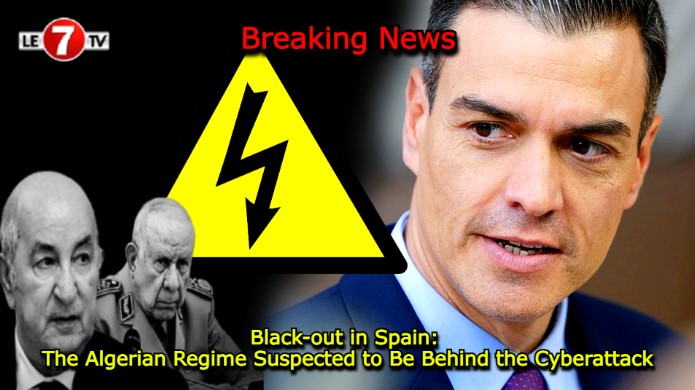Black-out in Spain: The Algerian Regime Suspected to Be Behind the Cyberattack

On Monday, April 28, a massive blackout plunged Spain, Portugal, and parts of France into an unprecedented electrical chaos. Behind this technological disaster, one name is repeatedly whispered among cybersecurity experts: the Algerian regime.
While light is slowly returning to the Iberian Peninsula, shadows deepen around the origin of this monumental outage. Subways paralyzed, trains halted, telecommunications cut off, ATMs down, traffic lights out of service, and millions of citizens left to fend for themselves in a Europe frozen in darkness. The incident, described by the European Commission as “the most serious recorded in Europe in recent years,” is anything but ordinary. According to multiple analysts, it bears the hallmarks of a coordinated offensive operation—its prime suspect and likely sole mastermind: Algeria’s military regime.
An Obvious Motive
Algeria, the dark power of the Maghreb, engaged in a cold war with Morocco and nearly severed diplomatically from Spain and France, may have crossed the Rubicon by orchestrating, through Russian dark web networks, a cyberattack targeting European electrical infrastructures. According to experts, this hypothesis has gained considerable credibility since Madrid’s recognition of Morocco’s sovereignty over its Sahara.
Indeed, ever since Spain backed Morocco’s autonomy plan for the Sahara, Algiers has continuously displayed its outrage through diplomatic ruptures, energy threats, and all-out hateful propaganda. Pedro Sánchez’s pivot in favor of Morocco was perceived as a betrayal by a desperate Algerian regime, humiliated on the international stage.
Algeria is already suspected of being behind cyberattacks targeting Moroccan interests via shadowy partnerships with Russian and Iranian hacker networks. For the Algerian generals, targeting Spain’s electrical grid sends a clear message of destabilization, in a geostrategic context already fraught with tensions with Madrid.
While certain officials—Pedro Sánchez and Antonio Costa foremost among them—have rushed to dismiss the cyberattack theory, other more clear-sighted voices, such as Andalusian regional president Juanma Moreno, have refused to rule out any scenario. Let us recall that sophisticated cyberattacks rarely leave immediate visible traces. And let us not forget that the Algerian regime’s favorite strategy relies precisely on systematic denial, false-flag operations, and the use of intermediaries to mask its direct involvement.
This is not the first time Algeria has been suspected of cyberattacks. Back in 2022, several Spanish servers were targeted by intrusion attempts, as were sensitive French entities. It is no coincidence that Algiers has deepened its covert cooperation with secretive Iranian and Russian organizations specializing in cyberwarfare—part of a broader policy of permanent hostility toward its neighbor Morocco and former European partners France and Spain, who have turned their backs on it over the issue of the Moroccan Sahara.
The Algerian regime, entrenched in paranoid authoritarianism, now seeks to impose its revenge by any means necessary. Today, its weapon is no longer gas—but the silent sabotage of vital infrastructure.
Can the European Union afford to remain naive? Cyberattacks are now acts of war. If the Algerian connection is confirmed, it must lead to harsh diplomatic sanctions and a comprehensive overhaul of Europe’s electrical, energy, and cybersecurity frameworks.
The lights may be back on across the Iberian Peninsula—but the dark veil over the truth remains. And looming behind it is the heavy shadow of Algiers.
Abderrazzak Boussaid / Le7tv





